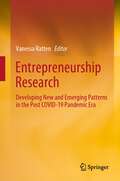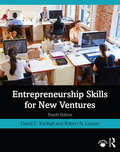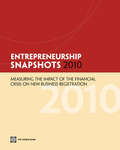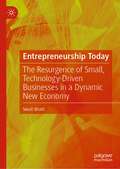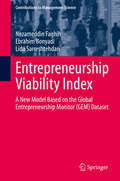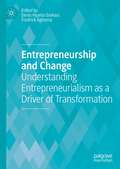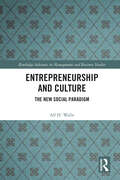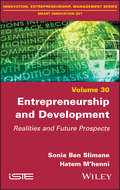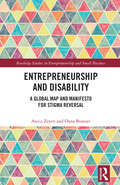- Table View
- List View
Entrepreneurship Reading: Experimenting in the Entrepreneurial Venture
by Eric Ries Sarah Dillard Thomas R. EisenmannEntrepreneur Eric Ries coined the term "lean start-up" to describe organizations that follow the principles of hypothesis-driven entrepreneurship. Entrepreneurs in these startups translate their vision into business model hypotheses, then test the hypotheses using a series of "minimum viable products," each of which represents the smallest set of features or activities needed to validate a concept. Founders of a lean start-up also know that time counts among their scarcest resources. Put simply: speed matters. Like lean manufacturing, the lean start-up method accelerates the tempo of innovation by using rapid iteration, small batches, and short cycle times. "Experimenting in the Entrepreneurial Venture" begins by contrasting the hypothesis-driven entrepreneurship approach with other methods. The Reading also explains, step-by-step, how to formulate business model hypotheses, test them, and act on the test feedback. In the final section, the Reading considers what settings are best suited for hypothesis-driven entrepreneurship. The Reading also includes a section on special topics, a glossary of key terms, and suggestions for complimentary cases and further reading.
Entrepreneurship Reading: Financing Entrepreneurial Ventures
by Ramana Nanda William R. Kerr James Mcquade"Financing Entrepreneurial Ventures" introduces students to the key issues involved in the financing of entrepreneurial enterprises. The Reading begins by examining how business models shape external financing requirements. It then contrasts the choice to bootstrap with the option to raise external funds, as well as the traits of debt versus equity investment. Students learn about the different types of equity investors-including angels, VCs, and strategic investors-and follow an entrepreneurial venture's path through the financing stages. Students also examine how entrepreneurs can adjust business models to match financial conditions, and how they can reduce financing needs through alternative models such as partnerships. Finally, the Reading covers emerging funding models-such as crowdsourcing and accelerators-and the global aspects of entrepreneurial finance. There are 6 Interactive Illustrations included in the Reading: "Calculating a Cumulative Cash Flow Curve," "Asset Intensity Ratio," "Building a Cap Table," "How Investor Expectations and Target Returns Drive Company Ownership," "Payouts from Simple Equity and Convertible Investments," and "Seed Note Ownership and Value."
Entrepreneurship Reading: Launching Global Ventures
by William R. KerrGlobal ventures are those that weave globalization into their businesses from the start. Technological advances and emerging markets are enabling entrepreneurs to extract more value than ever before from setting up in multiple countries. Also, the emergence of new kinds of competitors and threats makes it even more important for founders to seize the advantages of globalization early on. As a result, many founders purposefully embed globalization into the core of their ventures, rather than becoming global as ventures mature. This Reading provides insights and best practices to help founders avoid pitfalls and create a truly global strategy. The author offers a framework for categorizing ventures on the basis of whether they are globalizing primarily: products and services; people, ideas, and technologies; or finance. It also considers whether ventures are seeking to globalize the best they have to offer or to harness the best the world has to offer. After founders determine what they hope to gain from globalization, they must choose the best locations, decide how many countries to enter, adapt their business models to each location, and navigate the unique operational and managerial difficulties facing young global ventures. The Reading does not consider international entrepreneurship in its traditional sense. It is not about how starting a domestic-market-oriented company in Brazil differs from starting one in Japan, nor is it about long-established companies deciding to open their first facility abroad or evaluating how they will enter their 90th country. The insights in this Reading can inform managers in such companies but does so through the lens of ventures that were "born global." These young global ventures face more resource constraints, opportunity costs, and founding-team challenges than do large, established, and traditional companies. Focusing on these businesses helps identify key business model traits related to globalization.
Entrepreneurship Reading: Leading High-Growth Ventures
by Lynda M. ApplegateThis Reading explores how entrepreneurial leaders develop strategies, build capabilities, design their organizations, and address leadership and governance issues as they transition to growth and pursue increased scale and scope. It covers 3 ventures in detail-2 of which achieved economies of scale as they grew existing business and economies of scope as they expanded into new products and markets. It also examines a business that demonstrates the challenges many entrepreneurial leaders face as they pursue increased scope. Many believe that entrepreneurial leaders who launch a startup are unable to switch their approach to meet the needs of their growing businesses. Others, including the authors, claim that the skills required for growth can be learned. Regardless, entrepreneurs who wish to stay with their business must acquire new skills and capabilities and bring on the resources their growing company needs.
Entrepreneurship Reading: Partnering with Venture Capitalists
by Michael J. Roberts Jeffrey J. BussgangThis Reading takes a deep look at the venture capital (VC) industry in the United States. VCs have a unique perspective on opportunity evaluation, deal structure, new venture support, and exit strategy. Their work at all stages of the entrepreneurial life cycle offers many lessons to company founders, even those whose ventures are not backed by VC's. This Reading follows the chronological cycle of VC activity from the entrepreneur's vantage point: deal evaluation, deal pricing, structure and terms, working with VCs once the deal has been signed, and exit. The topics of deal pricing, structure, and terms are treated in particular depth through a detailed examination of a "term sheet"-the contract that sets out the terms of the VC financing.
Entrepreneurship Reading: Selling and Marketing in the Entrepreneurial Venture
by Frank V. Cespedes"Selling and Marketing in the Entrepreneurial Venture" discusses key aspects of selling and marketing in an entrepreneurial venture. The Reading explains how to identify and test a venture's potential with early adopters, how to identify core customers, and how to integrate selling and marketing activities in a new business. It also sheds light on how entrepreneurs can sharpen their understanding of customers, as well as gain valuable insights into the venture's product or service, by conducting visits with potential customers. In addition, this Reading provides an in-depth example of a relatively young company that discovers a need to redefine who its best customers should be. The Reading dispels myths about what defines an effective salesperson and explores basic aspects of integrating selling and marketing in a venture, including how best to use the sales funnel framework and how to make decisions about the company's go-to-market system. A supplementary reading offers deeper insight into the considerations that potential customers evaluate in deciding whether to switch from a product or service they are currently using to one offered by a new venture. A second supplemental section analyzes the selling and marketing challenges faced by the founders of an engineering startup and the strategies the founders formulate and execute to surmount those challenges and drive growth in the business.
Entrepreneurship Research: Developing New and Emerging Patterns in the Post COVID-19 Pandemic Era
by Vanessa RattenThis book explores how the COVID-19 pandemic has changed entrepreneurial business practices and policies. The role of digitalization and de-internationalisation as part of entrepreneurial business thinking is discussed in this book as a way of keeping track with new research avenues. Due to the fundamental way the COVID-19 pandemic shocked and surprised entrepreneurs, it becomes important to develop new business patterns. The discussion in this book centres on the question: how has business practices changed in the post-COVID-19 era and what needs to be learnt? Each chapter in this edited book presents a different way to understand these changes and make sense of alterations in the global business environment, thereby ensuring that business academics, policy makers and practitioners are kept abreast of changes. Whilst there have been books on the COVID-19 pandemic, this book goes a step further by presenting new research into the post-COVID-19 pandemic era that is of a recent nature. This means it is amongst the first edited book to focus on patterns in terms of business marketing and management that have an entrepreneurial nature. This is helpful to gain a better nuanced and detailed understanding about the implications that are ongoing and future orientated arising from the COVID-19 pandemic.
Entrepreneurship Skill Building: Focusing Entrepreneurship Education on Skills Assessment and Development
by John S. Lyons Thomas S. Lyons Julie A. SamsonThis book explores the sea change in thinking about how to educate students of entrepreneurship, uses extant theory to develop a conceptual model of entrepreneurship skill development, describes an assessment tool for operationalizing this model, discusses how this tool can be utilized to develop entrepreneurship skills, and offers examples from the application of our approach in educational settings. It concludes with implications of this methodology for furthering both entrepreneurship education and the research that shapes it. The authors present an entrepreneurship skills assessment tool, which uses a theory of measurement that breaks from psychometrics (predictive approaches) and honors the volatility and uncertainty that characterizes entrepreneurship. This assessment tool can be used to integrate curriculum and co-curricular activities to ensure skill development. Focusing on a methodology for the measurement and development of entrepreneurship skills, this book will serve as a valuable resource to researchers and students alike.
Entrepreneurship Skills for New Ventures
by David C. Kimball Robert N. LussierAs business schools expand their entrepreneurship programs and organizations seek people with entrepreneurial skills, it has become clear that the skills and mindset of an entrepreneur are highly valued in all business contexts. This latest edition of Entrepreneurship Skills for New Ventures continues to focus on helping students develop entrepreneurial skills, whether they seek to become entrepreneurs or employees. Focusing on the entrepreneurial start-up process, the fourth edition of Entrepreneurship Skills for New Ventures takes the reader through the steps of selecting, planning, financing, and controlling the new venture. The authors cover multiple forms of new ventures, as well as ways to utilize entrepreneurial skills in other contexts, encouraging students to engage with the material and apply it to their lives in ways that make sense for them. Skill development features include: New exercise on Analyzing the Lean Entrepreneurship Model Option Entrepreneurial profiles of small business owners Personal applications for students to apply questions to their new venture or a current business Global and domestic cases Elevator pitch assignments which put students in the venture capitalist position Application exercises and situations covering specific text concepts Business plan prompts to help students construct a business plan over the course of a semester Featuring pedagogical tools like review questions and learning outcomes, and online materials which expand upon skill development and offer instructor resources, the fourth edition of Entrepreneurship Skills for New Ventures is the perfect resource for instructors and students of entrepreneurship.
Entrepreneurship Snapshots 2010
by World BankThe 2010 World Bank Entrepreneurship Snapshots (WBGES) provide a unique indicator of business creation around the world and facilitate the investigation of the factors that foster dynamic private sector growth. Now in its fourth year, the WBGES measure entrepreneurial activity in 115 developing and industrial countries over the six year period 2004-2009. Importantly, the data offer a distinctive and timely snapshot of the impact of the 2008-2009 financial crisis on entrepreneurial activity. There is wide variation in new business creation across countries: On average, about four new firms register every year for every 1,000 working age individuals in industrialized countries, while there is less than one new firm registered in low and low middle income countries. The data show that dynamic business creation occurs in countries that provide entrepreneurs with good governance, a strong legal and regulatory environment, and reduced red tape. The data also show that nearly all countries experienced a sharp drop in business entry during the crisis. However, industrialized countries experienced the crisis more quickly and more severely than other income groups. In addition, the degree to which the crisis impacted new firm creation is correlated with measures of crisis severity. Finally, we find that countries in which financial markets play a larger role in the domestic economy experienced sharper declines in new business registrations as a result of the crisis that paralyzed financial markets. These results can guide effective policymaking and deliver new capabilities for identifying the impact of reforms.
Entrepreneurship Strategy: Changing Patterns in New Venture Creation, Growth, and Reinvention
by Jill Kickul Lisa K. GundryIn this engaging and practical book, authors Lisa K. Gundry and Jill R. Kickul uniquely approach entrepreneurship across the life cycle of business growth—offering entrepreneurial strategies for the emerging venture, for the growing venture, and for sustaining growth in the established venture. Written from the point of view of the founder or the entrepreneurial team, the book offers powerful and practical tools to increase a venture's potential for success and growth.
Entrepreneurship Today: The Resurgence of Small, Technology-Driven Businesses in a Dynamic New Economy
by Swati BhattThis book explores how the U.S. has been in the throes of a startup revolution, fueled by a risk-taking culture. There has been a growth of young startup from 1994, accelerating after 2010 through the present day. Most entrepreneurial activity is in the professional and business services sector, which comprises technical services as well as research and development.However, new establishments face a low survival rate, suggesting that starting businesses is not the problem, sustaining their development and growth is the principal challenge. A paradox is presented by the simultaneous presence of declining labor force participation rate among prime working age adults, a decrease in productivity growth rates in the past decade and a startup revolution.There are five native skills that are acquired by experience rather than formal education: resourcefulness, practical intelligence, over-optimism and personal initiative. These are built on a foundation of attributes that form the culture of risk-taking and decision-making. Underlying values and beliefs include collaboration, openness to new ideas, an awareness of the environment and the needs of people in your radius of interaction. A strongly embedded community forms the essence of entrepreneurial culture, and its values cannot be taught, they must be learned through experience.
Entrepreneurship Viability Index: A New Model Based on the Global Entrepreneurship Monitor (GEM) Dataset (Contributions to Management Science)
by Nezameddin Faghih Ebrahim Bonyadi Lida SarreshtehdariThis book presents the Entrepreneurship Viability Index (EVI) as a focal point to define other novel indices. It also introduces readers to new concepts and metrics of entrepreneurship to help measure the lifespan of entrepreneurial activities and quantify the capabilities of entrepreneurs as well as the share of efficient businesses at the country level. Using a variety of mathematical models and providing details for each category of business, EVI is measured as the ratio of the ‘rate of entrepreneurial activities’ to the ‘rate of exit from the business’, reflecting the sustainability, durability, business success, and status of entrepreneurial activities in a country. These metrics offer a unique opportunity for researchers and policymakers to assess the status of efficient entrepreneurial activities, which influence the economy, and to study economic resistance in the event of economic shocks or recessions. The book provides valuable information on various key concepts in entrepreneurship, such as the interaction of individual and environmental factors, motivation and entrepreneurial activities, which allow the prediction of entrepreneurship treatment across countries. This in turn plays a significant role in identifying the factors that secure or threaten a country’s business sector. The book helps readers, researchers, policymakers, lenders, "angel investors" and anyone with a financial interest in entrepreneurial businesses to understand how even more viable businesses could be created than is the case today, and to recognize new categories of budding entrepreneurs.
Entrepreneurship als Katalysator: Die Etablierung nachhaltiger Konsum- und Produktionsmuster im Tourismus (Entrepreneurial Management und Standortentwicklung)
by Sebastian SpeerSebastian Speer untersucht, wie Entrepreneurship eine katalytische Funktion in Bezug auf die Etablierung nachhaltiger Produktions- und Konsummuster im Tourismus einnehmen kann. Dazu entwickelt er ein Modell, das neben der Unternehmerperson auch unterstützende Akteure sowie spezifische Rahmenbedingungen in einen Wirkungskontext integriert, und wendet es auf den Bereich des Tourismus an. Es kann Personen aus Wissenschaft und Praxis dabei helfen, Erfolgsfaktoren bei der Etablierung von nachhaltigkeitsorientierten Angeboten zu identifizieren und zu nutzen.
Entrepreneurship and Big Data: The Digital Revolution (Big Data for Industry 4.0)
by Chhabra Meghna Hassan Rohail Shamim AmjadThe digital age has transformed business opportunities and strategies in a resolutely practical and data-driven project universe. This book is a comprehensive and analytical source on entrepreneurship and Big Data that prospective entrepreneurs must know before embarking upon an entrepreneurial journey in this present age of digital transformation. This book provides an overview of the various aspects of entrepreneurship, function, and contemporary forms. It covers a real-world understanding of how the entrepreneurial world works and the required new analytics thinking and computational skills. It also encompasses the essential elements needed when starting an entrepreneurial journey and offers inspirational case studies from key industry leaders. Ideal reading for aspiring entrepreneurs, Entrepreneurship and Big Data: The Digital Revolution is also useful to students, academicians, researchers, and practitioners.
Entrepreneurship and Change: Understanding Entrepreneurialism as a Driver of Transformation
by Denis Hyams-Ssekasi Fredrick AgbomaThis book offers novel and contemporary thinking of entrepreneurship and change. It espouses the distinct but reciprocal nature of both concepts to unravel high levels of transformation, both in terms of social structures and social relations, inherent in new venture creation. It provides insights from a theoretical, educational, and industrial context with emphasis on holistic approaches to change. Each chapter illuminates distinct elements of the entrepreneurial landscape and the importance of learning, creativity and innovation as tools for practice and knowledge management. This book is an essential resource for practitioners, researchers, and policy makers because it provides new outlooks and dimensions on the transformational powers of entrepreneurship and change.
Entrepreneurship and Cluster Dynamics (Routledge Studies in Entrepreneurship)
by Tom Elfring Cristina Boari Xavier F. Molina-MoralesEntrepreneurship and Cluster Dynamics focuses on the origin and development of clusters and specifically on the role played by the strategic entrepreneurship in these contexts. Although separately entrepreneurship and cluster studies have already attracted the attention of academics and practitioners; this book aims to go further and offer an integrated and interactive view of topics. The cross-cutting approach is one of the main attributes of this book. In fact, the book involves a great range of organizational and economic perspectives, from social psychology to conventional applied economics disciplines. Moreover, these topics allow the use of different levels of analysis, from the individual entrepreneur behind a start-up to the structure of cluster networks, including the organizational levels. An analysis of the change and development of clusters going further than traditional functional approaches by examining how entrepreneurs and their actions are not only influenced by the cluster but also shape the cluster development, will offer an explanation of how entrepreneurship and networking entrepreneurs can foster, perhaps also inhibit, cluster development and change. Finally Entrepreneurship and Cluster Dynamics theorizes about the role of the strategic entrepreneurship in developing start-ups inside already established companies, which can play the role of broker in the cluster. Entrepreneurship and Cluster Dynamics offers a unique opportunity to academics, researchers, and students to learn about relations and interactions between entrepreneurship and cluster perspectives, providing both newly and original theoretical propositions and also rigorous conclusive empirical exercises.
Entrepreneurship and Culture
by Roy Thurik Andreas FreytagThe book is an innovative compilation of papers that explore the relationship between cultural features and entrepreneurship. The relative stability of differences in entrepreneurial activity across countries suggests that other than economic factors are at play. The contributions to this edited volume deal with the foundations of entrepreneurship and with the effects of different cultural settings on the incidence and success of entrepreneurs. Topics are individual decision making in a cultural context, regional aspects of entrepreneurship, cross-country differences, and the influence of culture on entrepreneurial activity.
Entrepreneurship and Culture: The New Social Paradigm (ISSN)
by Alf H. WalleThe classic and dominant paradigm of entrepreneurship emphasizes the relatively universal and homogeneous responses of a small, but influential, minority as they make unique and breakthrough contributions. Entrepreneurs are often viewed as inspired individualists who possess the courage to "go against the grain" as they risk it all to pursue an impassioned vision. According to Joseph Schumpeter and those who build upon his seminal perspectives, such entrepreneurial individuals pursue a path of "creative destruction" that paves the way towards true and innovative progress. Today, state of the art research is tempering and transcending this classic vision by acknowledging a wider array of cultural, psychological, and environmental contexts, influences, and responses. This monograph contributes to this research stream by viewing entrepreneurs within a cultural perspective and advocating viewing entrepreneurship in "culturally competent" ways. Presenting these perspectives in a short and circumscribed volume provides an elegant and influential means of disseminating these important perspectives. Entrepreneurship and Culture expands beyond popular and conventional views of entrepreneurship and provides readers with alternative perspectives in even-handed ways. It shows the latest state of knowledge on the topic and will be of value both to advanced students, and to academics and practitioners in the fields of entrepreneurship, international business, leadership and organizational studies. Beyond the business school, this book will also be of interest to anthropology, economic development, and indigenous studies scholars.
Entrepreneurship and Culture: The New Social Paradigm (Routledge Advances in Management and Business Studies)
by Alf H. WalleThe classic and dominant paradigm of entrepreneurship emphasizes the relatively universal and homogeneous responses of a small, but influential, minority as they make unique and breakthrough contributions. Entrepreneurs are often viewed as inspired individualists who possess the courage to "go against the grain" as they risk it all to pursue an impassioned vision. According to Joseph Schumpeter and those who build upon his seminal perspectives, such entrepreneurial individuals pursue a path of "creative destruction" that paves the way towards true and innovative progress. Today, state of the art research is tempering and transcending this classic vision by acknowledging a wider array of cultural, psychological, and environmental contexts, influences, and responses. This monograph contributes to this research stream by viewing entrepreneurs within a cultural perspective and advocating viewing entrepreneurship in "culturally competent" ways. Presenting these perspectives in a short and circumscribed volume provides an elegant and influential means of disseminating these important perspectives. Entrepreneurship and Culture expands beyond popular and conventional views of entrepreneurship and provides readers with alternative perspectives in even-handed ways. It shows the latest state of knowledge on the topic and will be of value both to advanced students, and to academics and practitioners in the fields of entrepreneurship, international business, leadership and organizational studies. Beyond the business school, this book will also be of interest to anthropology, economic development, and indigenous studies scholars.
Entrepreneurship and Development in Nepal: Post-COVID Implications (Entrepreneurship and Development in South Asia: Longitudinal Narratives)
by Jay Mitra Pawan Adhikari Shovita Dhakal Adhikari Rupesh Krishna ShresthaThis book illustrates a connection between entrepreneurship and development in an emerging economy context, focusing on Nepal. That entrepreneurship contributes to sustainable development by creating jobs, elevating economic growth, promoting innovation, and mitigating social and environmental challenges is discussed in other works. Entrepreneurship is linked to several sustainable development goals. However, relatively little is known about entrepreneurship in Nepal at an international level and rarely have researchers attempted to explore the relationship between entrepreneurship and development in the Nepalese context. In this regard, this book generates valuable insights, not only contributing to policy implications but also setting a direction for entrepreneurship research in Nepal within a wider context of sustainable development. In particular, the book discusses several important issues on entrepreneurship, including migrant entrepreneurship, entrepreneurial ecosystem, social entrepreneurship, entrepreneurial finance, community-based entrepreneurship, and tourism entrepreneurship, issues which are intrinsically connected to the sustainable development of the country. In addition to policy contributions, the book provides a direction for facilitating theoretically underpinned work in entrepreneurship and development in the Nepalese context. The factors driving entrepreneurship, including specific social-cultural and historical factors that remain relevant for emerging economies, and emancipation, inclusion and participation, which are central to achieving development, are to be theorized in order to better understand the relationship between entrepreneurship and development. The topics covered by the book will be of interest to policy-makers from ministries and departments, international organizations, and development partners.
Entrepreneurship and Development: Realities and Future Prospects
by Sonia Ben Slimane Hatem M'henniIn analyzing the complex link between entrepreneurship, innovation and development in the context of the emerging world, this book offers a holistic reading of this triptych based on a theoretical foundation that is itself subject to controversy: the national system of innovative entrepreneurship. The “emerging” nature of the studied countries provides specific insights, and allows the theoretical developments to be fine-tuned to the current issues. In a context that makes competitive advantages transient, emerging markets can provide a real test case for responding in a structural and innovative way to social and economic challenges, thus ensuring the sustainable performance of their innovative entrepreneurial system. Entrepreneurship and Development advocates for the integration of the social and cultural history of a given country within the framework of public policies, and proposes more targeted actions for innovative entrepreneurial activities. Moreover, the education system must integrate the entrepreneurial culture and foster multidisciplinarity to support the transfer of knowledge to markets.
Entrepreneurship and Disability: A Global Map and Manifesto for Stigma Reversal (Routledge Studies in Entrepreneurship and Small Business)
by Oana Branzei Anica ZeyenDiscover how entrepreneurship can dismantle the structural, social, cultural, and internalized stigma of disability in this compelling book. Journey through six countries and uncover inspiring stories of disabled people using diverse entrepreneurial strategies – micro-entrepreneurship, social entrepreneurship, activism, bricolage, compassion, and institutional entrepreneurship – to challenge and overcome stigma.Meet Belen Dofitas, who aids people affected by leprosy in the Philippines through micro-enterprise opportunities. Explore the efforts of Ugandan bricoleurs creating small-scale activities to uplift their communities. Discover the impact of a Kenyan psychiatrist’s peer-to-peer mental health interventions and the Global Minds Collective. Follow six UK women with invisible disabilities as they transform their experiences into powerful advocacy through a documentary. Learn about Neha Arora’s all-disability travel agency, Planet Abled based in India, and her work to allow everyone to read the book that is life. Understand how neurosurgeon Neilank Jha’s work on concussion treatment and brain–computer interfaces is improving lives.These diverse narratives highlight different pathways to systemic change and disability destigmatization. The book concludes by showing how initial slow system changes can accelerate, leading to significant transformations and manifesting declarations that can ultimately change the system. Dive into these stories of entrepreneuring against disability stigma and see how disability entrepreneurship can foster a more inclusive world.
Entrepreneurship and Dynamics in the Knowledge Economy (Routledge Studies in Global Competition)
by Charlie Karlsson Roger R. Stough Börje JohanssonThe phenomenon of entrepreneurship has attracted researchers from a variety of disciplines and a diverse number of analytical approaches. Currently, there is a considerable amount of confusion and a variety of conflicting theories which are being used interchangeably and ambiguously. In this important new book, the authors argue that there are analytically distinct forms of entrepreneurship, each of them having an individual logic of their own. They highlight the role of individual economic agents with endowments of new knowledge or new combinations of old knowledge as entrepreneurs, and thus identify them as dynamic factors in the knowledge economy. Overall, this book not only provides a contemporary overview of current research in the field, but also summarizes the policy conclusions that can be drawn from current research.
Entrepreneurship and Economic Development
by Wim NaudéLeading international scholars provide a timely reconsideration of how and why entrepreneurship matters for economic development, particularly in emerging and developing economies. The book critically dissects the evolving relationship between entrepreneurs and the state.

